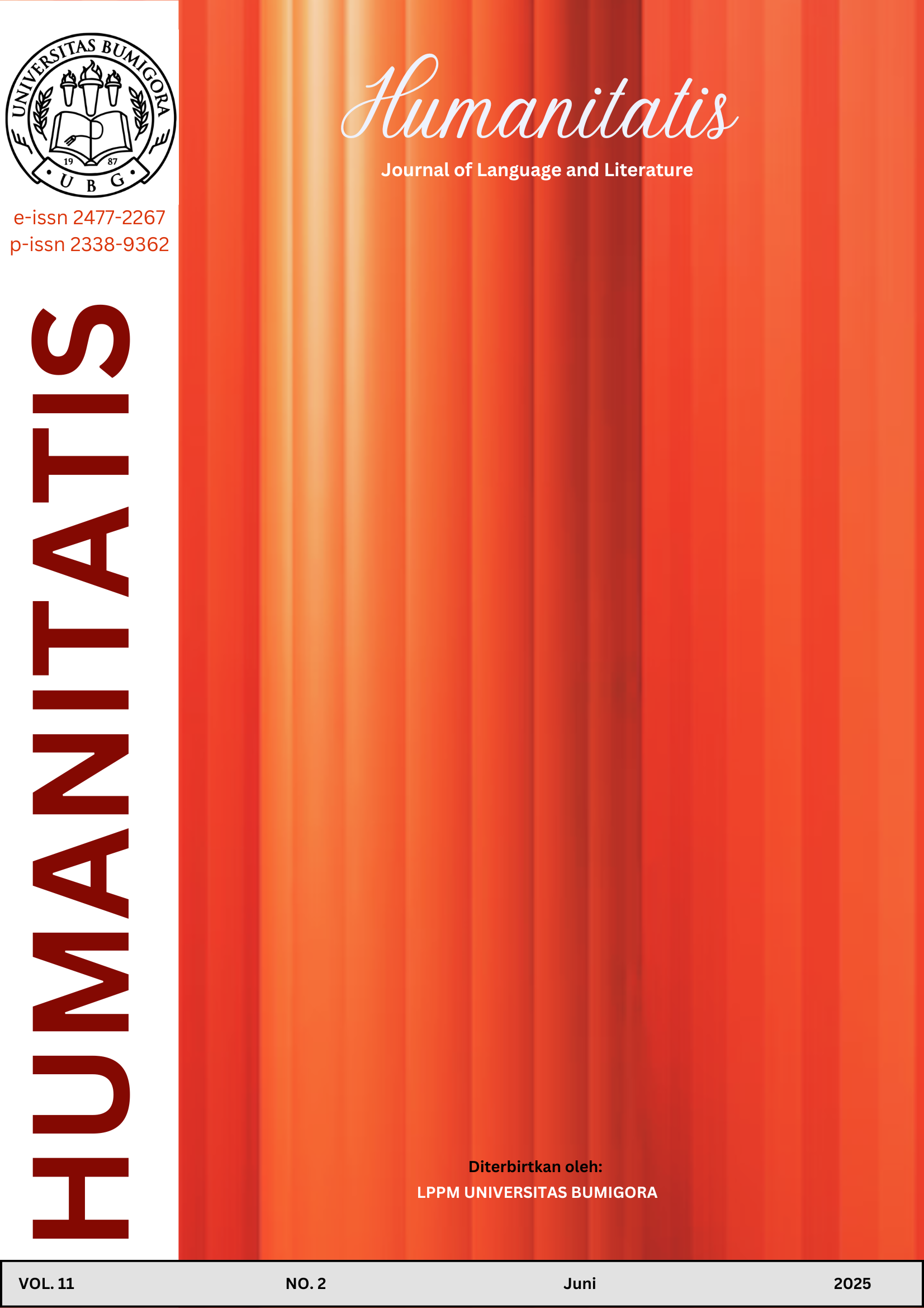An Analysis of Impoliteness Strategies in “The Devil Wears Prada” Movie
DOI:
https://doi.org/10.30812/humanitatis.v11i2.4838Keywords:
Impoliteness, Movie, PragmaticsAbstract
This research analyzes the impoliteness strategies used in “The Devil Wears Prada” movie, focusing on how these strategies reflect the power dynamics and emotional tensions between characters. By exploring examples of bald on-record impoliteness, positive and negative impoliteness, sarcasm or mock politeness, and withholding politeness, the study intends to reveal the implications of these strategies on the characters’ interactions, self-perception, and the overarching themes of ambition and identity in the film. This research utilized a descriptive qualitative method. Data was collected through observational and non-participatory techniques. The researcher observed the dialogue from the movie "The Devil Wears Prada" and recorded the data using note-taking. The non-participatory technique was employed because the researcher did not directly engage as a participant in the conversations. The analysis was conducted using the pragmatics identity method. The analysis reveals two instances of bald on record impoliteness, two instances of positive impoliteness, two instances of negative impoliteness, two instances of sarcasm or mock politeness, and one instance of withheld politeness. In examining the impoliteness strategies utilized in “The Devil Wears Prada”, it becomes clear that the characters often employ various methods to exert power and control in their interactions. Miranda Priestly, in particular, uses direct insults, sarcasm, and dismissive remarks to establish her dominance and reinforce the existing social hierarchies within the workplace. Furthermore, the film demonstrates that these strategies highlight the ruthless nature of the fashion industry and influence character development and audience interpretation. Ultimately, the dynamics of impoliteness enhance the film’s themes of ambition, sacrifice, and the ethical dilemmas found in professional settings.
References
Abimanto, D., Oktavia, A., Aprillina, A., & Yuliatin, A. S. A. (2023). Characters’ Impoliteness in Paranorman Movie. Inspirasi Dunia: Jurnal Riset Pendidikan dan Bahasa, 2(1), 127–138. https://doi.org/10.58192/insdun.v2i1.427
Bousfield, D., & Locher, M. A. (2008, September). Impoliteness in Language: Studies on its Interplay with Power in Theory and Practice. Walter de Gruyter.
Brown, P., & Levinson, S. C. (1987, February). Politeness: Some Universals in Language Usage. Cambridge University Press.
Creswell, J. W., & Guetterman, T. C. (2019). Educational research: Planning, conducting, and evaluating quantitative and qualitative research (Sixth edition). Pearson.
Culpeper, J. (1996). Towards an anatomy of impoliteness. Journal of Pragmatics, 25(3), 349–367. https://doi.org/10.1016/0378-2166(95)00014-3
Culpeper, J. (2005). Impoliteness and Entertainment in the Television Quiz Show: The Weakest Link. Journal of Politeness Research. Language, Behaviour, Culture, 1(1). https://doi.org/10.1515/jplr.2005.1.1.35
Culpeper, J. (2011, January). Impoliteness: Using Language to Cause Offence. Cambridge University Press.
Culpeper, J., Bousfield, D., & Wichmann, A. (2003). Impoliteness revisited: With special reference to dynamic and prosodic aspects. Journal of Pragmatics, 35(10), 1545–1579. https://doi.org/10.1016/S0378-2166(02)00118-2
Djohan, M. S. S., & Simatupang, E. C. (2022). Impoliteness Strategies in Cruella Movie: Pragmatics Study. Budapest International Research and Critics Institute-Journal (BIRCI-Journal, 5(3), 18931–18938. https://doi.org/10.33258/birci.v5i3.5898
Dunggio, A. S., Bay, I. W., & Ali, S. W. (2024). Impoliteness Strategies Used in The Movie Do Revenge. Jurnal Bahasa, Sastra, dan Budaya, 14(3), 1–12. https://doi.org/10.37905/jbsb.v14i3.28894
Fatmawati, F., Burhamzah, M., & Rosalia, H. (2024). Impoliteness Strategies Used in Coda Movie by Sian Heder. Journal of English Literature and Linguistic Studies, 3(1, Nov), 1–14. https://doi.org/10.26858/jells.v3i1.Nov.61668
Kelvin, K., & Rudianto, G. (2023). An Analysis of Impoliteness Strategies in “Can You Ever Forgive Me?” Movie. IDEAS: Journal on English Language Teaching and Learning, Linguistics and Literature, 11(1), 471–481. https://doi.org/10.24256/ideas.v11i1.3877
Khaqqi, A. A., & Pradipta, B. (2024). An Analysis of Impoliteness Strategy Used by The Main Character in "A Man Called Otto" Movie. Proceeding of Undergraduate Conference on Literature, Linguistic, and Cultural Studies, 3(1), 115–123. https://doi.org/10.30996/uncollcs.v3i1.4465
Leech, G. (2014, July). The Pragmatics of Politeness. Oxford University Press. https://doi.org/10.1093/acprof:oso/9780195341386.001.0001
Leech, G. N. (2016, February). Principles of Pragmatics. Routledge.
Ratri, A., & Ardi, P. (2019). Power and Impoliteness in The Devil Wears Prada Movie. Elite: English and Literature Journal, 6(1), 33–50. https://doi.org/10.24252/elite.v6i1a3
Sudaryanto, S. (1993). Metode dan aneka teknik analisis bahasa: pengantar penelitian wahana kebudayaan secara linguistis. Duta Wacana University Press.
Wijaya, R. K. A. R., Rahmadhan, A., & Maulana, B. (2023). An Analysis of Impoliteness Strategies in Mobile Legends Bang Bang Player on Twitter @mlbbfess Followers. FRASA: English Education and Literature Journal, 4(1), 29–31. https://doi.org/10.47701/frasa.v4i1.2621
Yaseen Hassan, A., Firas Abdullah Al-Rawe, M., Shamel Abdullah, S., & Hlaimi, S. (2023). Analysis of Impoliteness Strategies Used in Putin’s Speech at Annexation Ceremony. Journal of Pragmatics Research, 5(2), 153–167. https://doi.org/10.18326/jopr.v5i2.153-167
Yule, G. (1996, June). Pragmatics. OUP Oxford.
Downloads
Published
Issue
Section
License
Copyright (c) 2025 Nurhana Tri Rizqi, Afriana

This work is licensed under a Creative Commons Attribution 4.0 International License.
















